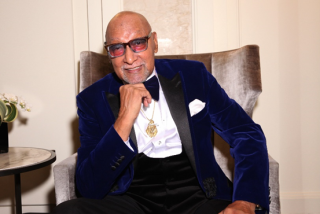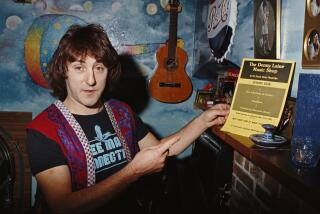Levi Stubbs, lead singer of the Four Tops, dies at 72
- Share via
Levi Stubbs, the lead singer of the legendary Motown group the Four Tops whose tough yet soulful voice was showcased on dozens of singles, including “Baby I Need Your Loving” and “I Can’t Help Myself (Sugar Pie, Honey Bunch),” has died. He was 72.
Stubbs died Friday at his home in Detroit, the Wayne County Medical Examiner’s office confirmed. A series of illnesses that included a stroke and cancer had caused him to stop performing in 2000.
“We have lost one of the great voices of the 20th century,” said Otis Williams of another Motown hit-maker, the Temptations. “A few years ago in Las Vegas, I told Levi, ‘You are our black Frank Sinatra.’ Levi could phrase a song just as beautifully.”
In a statement, Motown record label founder Berry Gordy Jr. called Stubbs “the greatest interpreter of songs I’ve ever heard” and the Four Tops “the greatest and most loving group.”
The Four Tops were applauded for such hits as “Reach Out (I’ll Be There)” and “Bernadette” and -- as the decades rolled by -- for their longevity.
The original members came together in 1953 while in high school in the Detroit area. They spent the ensuing 44 years performing without a change in the lineup, and then only because founding member Lawrence Payton died in 1997. Another original member, Renaldo “Obie” Benson, died in 2005.
The only surviving member, Abdul “Duke” Fakir, leads a version of the Four Tops that includes Payton’s son, Roquel.
Stubbs “could easily have made it as a solo star,” Gordy said, “but his love and loyalty” kept the four men “together longer than any group I know. His integrity and character were impeccable.”
Author and music historian David Ritz told The Times that Stubbs had “one of the great soul voices of the last 50 years.”
“You could hear the tear in his voice -- there was a kind of plaintive cry and an anguish and a pain,” Ritz said. “He’s going to live forever in the annals of American pop music.”
He was born Levi Stubbles on June 6, 1936, into a large family in Detroit and grew up poor. His father was a foundry worker.
At a friend’s birthday party, the quartet first sang together and were soon performing as the jazz vocal quartet the Four Aims, backing up such names as Count Basie and Della Reese.
By 1956, they had changed their name to the Four Tops to avoid being confused with another quartet, the Ames Brothers.
“We were aiming for the top,” Stubbs once said as an explanation for the group’s new name. He also shortened his last name about this time, according to “Contemporary Musicians” (1994).
After about a decade of relative obscurity, they signed with Motown Records after Gordy saw them perform on “The Tonight Show” with Johnny Carson.
They found a family atmosphere where “everybody was rooting for each other,” Stubbs said in 1982 in the Washington Post.
“We would sing background vocals for the Supremes, Marvin Gaye. . . . If one of the Temptations wasn’t there, one of us would take his place. It was great.”
The Four Tops had completed a jazz release when Gordy scrapped it and refocused them on R&B, pairing them with the noted Motown producing and songwriting team of Brian and Eddie Holland and Lamont Dozier.
In 1964, the group had a hit with “Baby I Need Your Loving” and in 1965 topped the charts with “I Can’t Help Myself.” More cheery, pop-soul numbers soon followed: “It’s the Same Old Song” and “Shake Me, Wake Me (When It’s Over).”
With “Reach Out (I’ll Be There),” they had another No. 1 hit in 1966, this time in Britain as well as the U.S. The song was “a soul-searing masterpiece” with “Stubbs’ hauntingly impassioned lead vocal in full cry,” The Times said in 1994.
When the songwriting team of Holland-Dozier-Holland left Motown in 1968, many music historians viewed the departure as an irreparable blow to the group, according to “The Encyclopedia of Rock & Roll.”
But with other Motown producers, the Four Tops cut a number of successful singles, including “River Deep, Mountain High” with the Jean Terrell-led Supremes and “Still Water (Love).”
After Motown moved to Los Angeles in 1972, the Four Tops wanted to stay in Detroit and signed with another label.
They would never duplicate the chart-topping success of their heady years at Motown. Still, they scored top 20 hits in the early 1970s with “Keeper of the Castle” and “Ain’t No Woman (Like the One I’ve Got).”
In all, the Four Tops landed 45 singles on the Billboard Hot 100 from 1964 to 1988.
By the early 1990s, the group was performing up to 200 times a year, often with the Temptations, on the oldies circuit.
In the movies, Stubbs also made a lasting impression, nearly belting down the house as the voice of the man-eating plant, Audrey II, in “Little Shop of Horrors,” according to 1986 film review in The Times.
Stubbs is survived by his wife of 48 years, Clineice; five children; and 11 grandchildren, the Associated Press reported.
More to Read
Start your day right
Sign up for Essential California for the L.A. Times biggest news, features and recommendations in your inbox six days a week.
You may occasionally receive promotional content from the Los Angeles Times.








